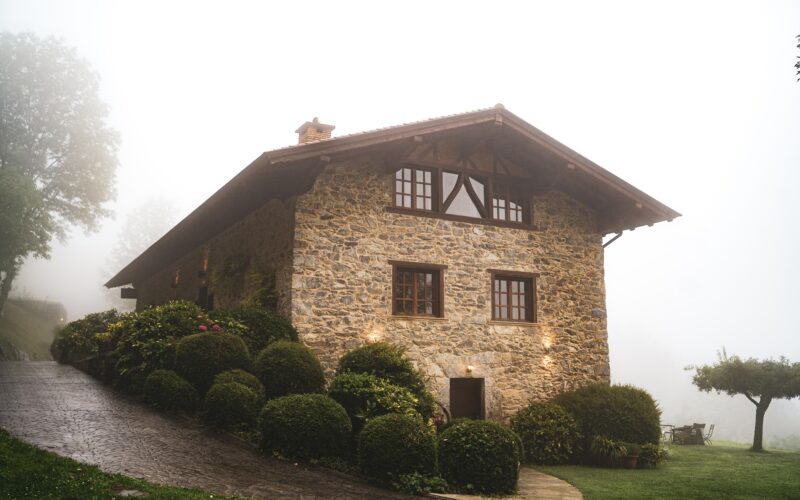Fiction by Timoteo Neves
Thaís stepped in front of the class. Her classmates were like bats with blinking eyes staring fixedly at her, ready to fly over her head and mess with her hair. The anticipation was palpable. Standing before them was the Brazilian, the girl with the cute accent.
“My House,” Thaís said, setting the title with the same half-sung intonation as the girl who had presented before her. “My house is on the mountains. She is made all of smooth stones.”
Someone giggled in the back.
Thaís felt something tugging inside her stomach. Could she already have lost points from the first two sentences she read of her piece? She looked at Ms. Samira sitting on the rolling chair with her long, flowy red dress and her legs crossed. The teacher gave her an encouraging nod, so the girl knew she could go on.
“My house is on the mountains,” she repeated to recover her pace. “She is made all of smooth stones. She is beautiful on the outside, but this is because she has a red hammock and a long garage for anyone to park the car. When it snows, you can still lay on the hammock and watch the snow fall.”
She paused for effect and to feel the temperature in the room.

She was content with the sound of “hammock” which she had practiced reading out loud for several days, and now it had rolled off her tongue like a lollipop. Someone coughed in the back in apparent disapproval. Thaís focused on a sparkly pencil case with bubbles on the desk of Yara, sitting in front of her. Yara’s dream was to marry a billionaire and go on vacations to the beaches in Brazil. That was the only conversation she had with her and Thaís never knew how to respond. Now she’d get distracted by her money-grubbing eyes.
No eye-contact. Just the sparkly pencil case. She proceeded.
“Inside there are African statues and they are wood. There is also paintings of the sunset and they have the color orange and black. In one painting the woman has cornrows.” Here she stopped briefly, for she had the temptation to say “just like me,” so she briefly looked at Ms. Samira, testing how many points she would get for swallowing her pride. When no points were promised, she continued. “There is a sofa and his color is black. But the black sofa is not as comfy as Grandma’s hammock.” She said the well-rehearsed word again, but didn’t realize her grandma had come into the mix.
“Hey,” said a boy called Antoine, who had the complexion of yoghurt and always had a sandwich stuffed with it in his bag, “but I thought you said your grandma lived in Brazil. And everybody knows it doesn’t snow in the Amazon. You’re not describing your house; you’re just coming up with stuff.”
“Did I say grandma?” Thaís said, her senses flaring with the interruption. “And this is my house. What do you know about my house?”
“Antoine, please,” Ms. Samira said with a tone of caution.
“But Miss, who even heard of a house like this?”
“I’ll remove points from you if you continue interrupting,” she said, motioning for Thaís to proceed.
But the girl froze and did not continue. The eyes surrounding her were indeed those of wild animals ready to attack her. She felt defenseless. She scavenged the room looking for any potential signs of comfort. But the tables in the room were much too tall, the floor had the wrong shade of beige, and the ceiling was a blank, white sea that the eye could easily drown in instead of symmetrical tiles. Nothing was as it should have been. Even the clock ticked in a foreign language.
“My house is on the mountains. She is made all of smooth stones,” Thaís repeated.
Except she knew it wasn’t.
There was one time since they moved to Lebanon that her family visited a house on the mountains and she felt the cool breeze in the air and snowflakes kissing the palm of her hand and wished there was also a hammock like in her grandma’s house where she could lie down and relax. The house belonged to a Kenyan couple and Thaís thought of how the Kenyan couple was more familiar to her than any Lebanese had been. At least they didn’t ask her where in Africa she was from. They just knew. Because the house was also not their house, but a rented house just like the apartment where Thaís’ family lived. So, what difference would it make? That might as well be her house.
Nothing was as it should have been. Even the clock ticked in a foreign language.
But her mind was racing, the clock was ticking, and the points in her oral presentation were flying away like a flock of birds. The girl saw her grade flying out of the windows and her mind sped up and her emotions burst like a cannonball. Finally, her mouth was let loose:
“My house is on the mountains and it is also sparkly and everyone sees it when is dark and sometimes there are bubbles and the bubbles are also sparkly and we have a pet monkey called Fernando who climbs and climbs and gets to the ceiling and our ceiling is not a big white ocean but it is all square and this is how it should be and in my house when you come in they don’t ask where you’re from, they just ask you to sit down and they’re nice and they’re just happy to be with you and that you are there and that you are respecting because you cleaned your feet on the carpet and that’s what actually matters. And that’s it. I’m finish.”
For the first time the class was completely still. Thaís beelined to her curvy table at the end of the room and put her backpack on top, violating classroom rules. She hid behind the plain, one-colored, not-sparkly bag, and closed her eyes and ears to the world around her.
The class must have clapped. One or two other oral presentations must have happened. And the bell must have rung, since Ms. Samira was now free to walk all the way to her table and try to look her in the eyes.
“Thay,” the teacher called. She had asked people to call her that, after many had attempted and failed to pronounce Thaís. “Is everything OK?”
“Yes, Miss.” Thaís answered. “Sorry, Miss.”
“Your house does sound like a nice place,” Ms. Samira said, cutting the cloud on the girl’s head with a ray of sunshine. “You also expressed yourself with a lot of fluency. Well done.”
“So … I didn’t fail?” Thaís asked.
“Of course not.”
“Thank you, Miss,” Thaís said, picking up her bag. “Miss,” she added as an afterthought, “my house is not actually on the mountains. I’m sorry I lied.”
“I know,” Ms. Samira said. “It’s OK if you don’t quite know how to describe your house, but you have described your heart. And I can tell you, it’s in the right place.”
Timóteo Pereira Neves was born in Brazil and moved to South Africa and then to Lebanon, where he lived for the past eleven years. He currently teaches English at the American Community School Beirut. An inspired learner and passionate fiction writer, he has previously shared his voice in Interact Magazine and in the book Student Writing Tutors in Their Own Words.












